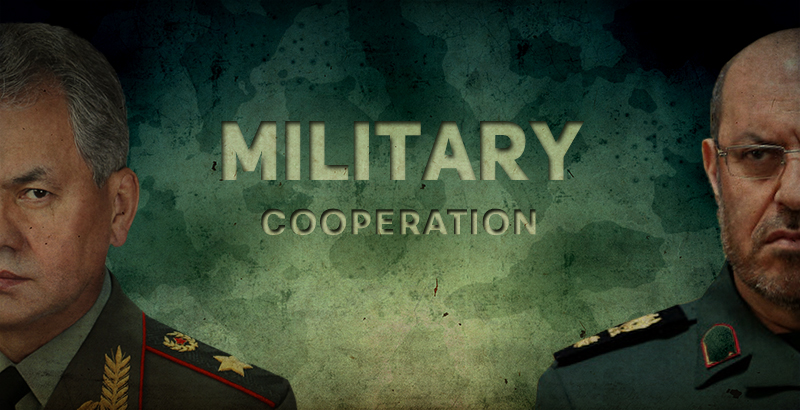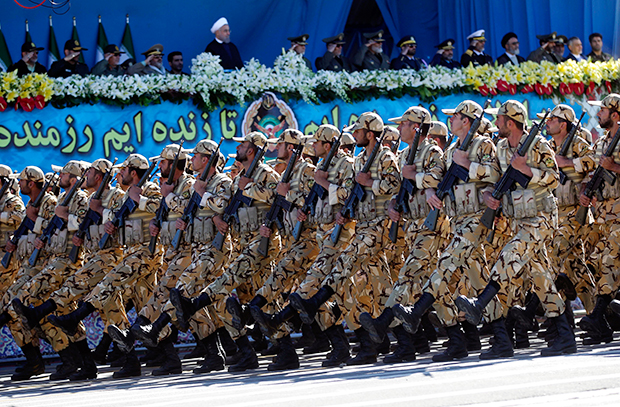Iran, with the support of Russia, can become a safe guarder of security in the Middle East

Originally appeared at Rusplt, translated by Theo N. Kaufman exclusively for SouthFront
From the 27th-28th of April, Moscow hosted the Fifth International Conference on Security, which was attended by about 500 representatives of military departments from more than 80 countries, as well as the members of such organizations as the UN, OSCE, CIS, CSTO and the ICRC. The main topics were the fight against terrorism, security in the Asia-Pacific region, the relations of Russia and Europe, and military cooperation.
The Islamic Republic of Iran was represented by the Ministry of Defence and Armed Forces Logistics, Hossein Dehghan, who arrived on an one-day visit at the invitation of the Defence Minister of the RF, Sergei Shoigu. After the welcoming message of President Vladimir Putin and Shoigu’ speech, the heads of the invited guests delegation presented their country’s position on regional and international issues, which was also the case for the Iranian defense minister.
Iranian rhetoric for several years remain unchanged. Dehgan accused the authorities of regional and extra-regional countries of providing financial, military-technical, logistical assistance to terrorist and radical groups operating in Afghanistan, Iraq, Syria, Lebanon, Libya, Yemen. In particular, Iran accused the United States, “the Zionist regime” (Israel) and Saudi Arabia in facilitating terrorism.
On the one hand, it may seem that Dehgan said nothing new and sensational. But, on the other hand, perhaps it is the constructive and consistent position of Tehran that is the key to success of Iran’s foreign policy in the region and around the world. From the very beginning of the “Arab Spring” and the war in Syria, Iran accused the same countries of aiding and abetting terrorism, while the West (US and Europe) and the Arab monarchies accused Iran of financing terrorism, having a plan to create a nuclear bomb, and of interfering in the internal affairs of other states. But, after a couple of years, it presented to the world, irrefutable evidence of arms supplies by the West to so-called armed opposition in Syria, due to the economic activity of Daesh in the sector of oil and selling of expensive antiques of Syria to antiquities and museums. The same position is held in the case Yemen, where there is a war, that remains in the shadows of the Syrian conflict.
During the presidency of Mahmoud Ahmadinejad, Iran held the same policy, but its sharp rhetoric and principled view of the West created the image of an aggressive Iran. After his election, Hassan Rouhani’s, tough rhetoric changed and he took steps to the solution of conflicts, but Tehran’s position on security issues remain the same, unlike the West. Throughout the period of chaos in the Middle East, the United States, yearly changed its position. Washington saw an enemy in Iran, in Russia, in Bashar al-Assad and, finally, IS.
Thanks to the consistent position of Iran on the issue of counter-terrorism and security in the Middle East, which generally coincides with the position of Moscow, Vladimir Putin, in April last year signed a decree on the resumption of supplies of anti-aircraft missile systems S-300, to Iran.
Initially, Iran needed the S-300 to protect its nuclear facilities at Natanz, Bushehr, Arak, because in the airspace above these facilities, Iran did have to shot down multiple Israeli drones (HAROP, so- called, self destructing, “kamikaze drone”, with a bomb attached to it), which had been used on Iran’s border with Azerbaijan in the “four-day war” against the Nagorno- Karabakh Republic from 2-5th of April. Today the range of threats has expanded considerably, given the success of Iran’s involvement in the conflict in Syria, Iraq, Yemen, this proved to irritate the West and the Persian Gulf countries (id est Gulf Cooperation Council (GCC) member states (UAE, Qatar, Saudi- Arabia).

Photo: Chavosh Homavandi / AFP
The end of economic sanctions against Tehran allowed it to expand military-technical cooperation, which both defense ministers of Iran and the Russian Federation underlined. The parties stressed the importance of strengthening and development of military-technical cooperation between the two states and to further intensify the struggle against terrorism. Dehgan called the military cooperation between Iran and the Russian Federation a “successful model” of relations. The visit of the Iranian establishment has been characterized as the beginning of a “new era” of military cooperation. The prerequisites for this was the trip of Sergei Shoigu in Tehran last year, and the visit of the Secretary of the Supreme National Security Council, Ali Shamkhani, to Moscow and, of course, the supply of the S-300.
In this regard, a number of questions rise. Why does having the powerful military support of the Russian Federation, not contribute to Iran’s accession to the CSTO? Or maybe there is an opportunity to create a new organization? Maybe, Iran is capable to act as a guarantor of security in the Middle East? These questions are answered by RF expert on Iran and the Middle East, a teacher at RAD, Anton Evstratov: “The CSTO was dominated by Russia, but the main problem of Iran’s inclusion in this organization, was its status as a pariah state after the sanctions in 2012, and in a broader sense – after the 1979 revolution. Iran is still not allowed to buy certain types of weapons, some politicians and military are on an UN’ sanctions list and can not officially leave the borders of their own country. What then is potential of a military cooperation within the framework of military-political blocs? But, at the same time, Russia started the process of actualization of the military cooperation with Tehran – partly in order to increase its popularity in the Islamic Republic of Iran, as part of fighting for a way out of isolation and seeking to tickle the West, in a post- Ukrainian conflict geopolitical landscape.
Another question – is the military cooperation in the Middle East, particularly in Syria. There, Iran needs Russia, it was the latter who sent the maximum number of military advisers, it was its troops that were leading the most complex operations, and also the provider of generals – they also increased the low combat preparedness of the Syrian armed forces. There, they formed an de facto military bloc, to which, in addition to Iran, “Hezbollah” joined and – with some reservations – also the Iraqi government. In the future we can talk about the accession to this bloc of Kurdish associations (YPG), this, however, will depend on the position of Damascus. Iran, is having a huge impact on the population of Iraq’ Shia area, Syria, Lebanon, Yemen and the Gulf states, it is trying to achieve stability in the region, especially after the withdrawal of US troops from Iraq. The Islamic Republic of Iran is trying to solve those countries economic and societal problems, carrying out modernizations, it is not interested in conflicts on its borders and in its the sphere of influence, but at the moment it is forced, albeit unsuccessfully, to fight. Perhaps the cooperation with Russia- is the key to the gradual solution of Iran’s goals, but we should understand that, fighting together against the Salafi threat and confronting the United States are a common goal but globally Tehran and Moscow still have different interests in the region. The search for compromise in the long term – is necessary for both countries if both desire to achieve serious cooperation, but, mindful of their past differences on economic issues, it’s still a bumpy ride ahead”.
The war that was imposed on Iran, the Iran-Iraq war of 1980-1988, and the following decades have shown that Tehran is able to provide security for not only its own, but also the whole region. Today it’s involved in almost all the regional conflicts, and even offers to mediate in one of the most difficult one – the Karabakhi conflict ( between Azerbaijan and Armenia). Having an ally, which has a clear cut position and who can not be subjugated to the pressure of more powerful states – is an advantage for any country.




What about taking money from Israel to pay for the USS Liberty and the murdered Americans directly murdered by the Zionist-Terrorist-State? As appose to the hypothetical down the chain supposed implication of Iran during time of war. As Lebanon was military occupied by Zionist forces, so Hezbollah had the Universal right of self defense. http://realzionistnews.com/